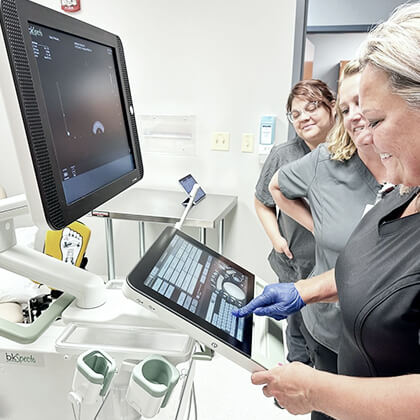
Pioneering Kidney Cancer Treatments: Contributions of Dr. Russo
Dr. Russo's Groundbreaking Approach to Kidney Cancer Treatment
In the realm of nephrology, the work of Dr. Russo has marked a significant pivot towards more innovative and effective strategies for managing renal malignancies. His methodology extends beyond traditional paradigms, positing a multifaceted approach that underscores the critical importance of early detection, surgical precision, and a deep understanding of the molecular underpinnings of kidney cancer. Through the meticulous integration of cutting-edge imaging techniques and biomarker research, his approach has enabled the identification and stratification of kidney tumors with unparalleled accuracy. This precision, in turn, facilitates the application of tailored surgical interventions that aim not only to eradicate cancerous cells but also to preserve renal function to the greatest extent possible, thereby enhancing patients' quality of life and long-term prognosis.
The cornerstone of Dr. Russo’s strategy rests on the adept application of robotic and laparoscopic surgery techniques, which have revolutionized the landscape of nephrectomy procedures. Such minimally invasive methods significantly reduce patient recovery time, decrease the likelihood of complications, and offer a more cosmetically favorable outcome compared to traditional open surgery. By leveraging these advancements, he has played a pivotal role in minimizing the physical and psychological impact of kidney cancer surgery, setting a new standard of care within the field.
Moreover, Dr. Russo’s commitment to research has provided invaluable insights into the genetic and environmental factors contributing to kidney cancer. His contributions have paved the way for personalized medicine in nephrology, enabling clinicians to develop treatment plans that are uniquely tailored to the genetic profile of an individual's tumor. This approach signifies a leap forward from one-size-fits-all treatments, promising greater efficacy and fewer side effects for patients.
| Impact Area | Description |
|---|---|
| Early Detection and Precision | Integration of imaging and biomarkers for accurate tumor identification and stratification. |
| Minimally Invasive Surgery | Adoption of robotic and laparoscopic methods to improve patient outcomes and recovery. |
| Personalized Medicine | Research into genetic variations to tailor treatments to individual tumors. |
| Overall Contribution | Enhancing survival rates and quality of life for kidney cancer patients through innovation and precision in treatment. |
Through this amalgamation of surgical prowess, research acumen, and a patient-centered approach, Dr. Russo's contributions to the field of nephrology embody the very essence of pioneering medical science. His innovations not only offer a beacon of hope for those afflicted with kidney cancer but also chart a course toward a future where the disease is no longer a verdict but a condition manageable through precision medicine.
The Evolution of Kidney Cancer Surgery Techniques
The transformation of kidney cancer surgery techniques signifies a critical evolution in the realm of nephrology, particularly through the contributions of luminaries like Dr. Paul Russo, urologist with an esteemed track record in pioneering cancer treatment. Initially, the surgical approach to kidney cancer entailed extensive open surgeries, which were notably invasive, requiring long recovery periods and presenting significant risks of complications. The paradigm began to shift as medical technology advanced, facilitating the development of laparoscopic and robotic-assisted surgeries. These minimally invasive techniques marked a significant leap forward, offering reduced pain, shorter hospital stays, and quicker returns to normal activities for patients.
Dr. Russo's work has been instrumental in refining these techniques, pushing the boundaries of what is possible in kidney cancer surgery. His commitment to integrating surgical excellence with a deep understanding of the disease's genetics has enabled more personalized surgical treatments. By tailoring the approach to the individual's genetic makeup, Dr. Russo has significantly improved surgical outcomes. This bespoke approach to treatment underscores an important trend in kidney cancer surgery: the move towards procedures that not only aim to remove the cancerous tissue but also preserve kidney function as much as possible, thereby enhancing the quality of life for patients post-operation.
Looking towards the future, Dr. Russo's ongoing research and clinical trials continue to pave the way for innovative surgical methods. By harnessing the power of emerging technologies such as augmented reality for precision surgery and exploring the potential of gene therapy in treating kidney cancer, his work promises to redefine the standards of care. This forward-thinking approach not only underscores the dynamic evolution of kidney cancer surgery techniques but also represents a beacon of hope for patients worldwide, offering a glimpse into a future where kidney cancer can be treated more effectively and with even greater precision.
Integrating Genetics into Personalized Kidney Cancer Care
In the realm of personalized medicine, the incorporation of genetic profiling into the treatment strategies for kidney cancer marks a significant leap forward. Spearheaded by the innovative works of Dr. Paul Russo, a renowned urologist, this approach tailors treatment plans to the genetic makeup of an individual's tumor, ushering in a new era of precision medicine. Unlike traditional one-size-fits-all therapies, this method emphasizes the genetic heterogeneity of kidney cancer, allowing for more targeted and effective interventions. It is predicated on the understanding that genetic mutations driving the growth of renal tumors vary from patient to patient, necessitating customized therapeutic strategies.
Dr. Russo's contributions in this field have been pivotal, demonstrating how genetic information can guide the choice of therapeutic agents, thereby enhancing the efficacy of kidney cancer treatments. By analyzing the molecular characteristics of kidney tumors, his team has been able to identify biomarkers that predict response to specific drugs, ultimately improving patient outcomes. This genetic insight not only facilitates the selection of drug therapies that are more likely to succeed but also helps in avoiding unnecessary treatments that could potentially harm the patient.
Furthermore, the implementation of genetic profiling has paved the way for the development of novel therapies targeting specific genetic aberrations. This precision oncology approach has not only yielded promising results in clinical trials but also offers hope for patients with advanced kidney cancer, who previously had limited treatment options. Dr. Russo's work in this area has not only contributed to the burgeoning field of personalized medicine but also exemplifies the potential of genetics in revolutionizing cancer care.
Looking ahead, the integration of genetic data into the management of kidney cancer promises to further refine treatment modalities, leading to more personalized and effective care strategies. As research spearheaded by visionaries like Dr. Russo progresses, the future of kidney cancer treatment appears increasingly poised to rely on a deep understanding of the genetic underpinnings of the disease, offering brighter prospects for patients worldwide.
Pioneering Minimally Invasive Procedures in Nephrology
In the realm of nephrology, the advent of less intrusive surgical methodologies represents a significant leap forward, a paradigm wholly embraced and advanced by Dr. Paul Russo, a preeminent urologist whose pioneering work has charted new territories in kidney cancer management. His innovative approach to treating this intricate malignancy does not solely hinge on the elimination of cancerous tissues but extends to preserving kidney function, thereby enhancing patients' quality of life. This philosophy is encapsulated in his development and refinement of techniques such as laparoscopic and robotic-assisted surgeries. These methodologies, marking a departure from traditional, more invasive practices, afford surgeons the precision needed to remove tumors effectively while sparing as much of the healthy surrounding tissue as possible.
The implications of Dr. Russo's contributions extend beyond the technical mastery of minimally invasive surgeries; they represent a broader shift towards personalized healthcare in nephrology. By integrating cutting-edge diagnostic tools and genetic profiling into patient assessments, he has been instrumental in identifying the most appropriate surgical pathways for individual cases, tailoring interventions to both the biological characteristics of the tumor and the patient's overall health context. This surgical preciseness, anchored in an intimate understanding of kidney cancer's heterogeneity, has significantly reduced post-operative recovery times, minimized complications, and, critically, preserved renal function to a degree previously unattainable.
As Dr. Russo’s methodologies continue to gain traction and evolve, the future landscape of kidney cancer treatment appears increasingly hopeful. His relentless pursuit of surgical innovation, combined with a keen eye on the integration of emerging technologies, signals a new era in nephrology—a field that now stands on the cusp of exploring even less invasive, more efficacious treatment modalities. The impact of his work on survival rates and quality of life for kidney cancer patients has been profound, underscoring the potential of minimally invasive procedures to redefine standards of care in nephrology. As we look ahead, the legacy of Dr. Russo’s pioneering spirit in kidney cancer treatment promises to inspire further breakthroughs, making what was once an insurmountable diagnosis more manageable and conquerable.
The Impact of Dr. Russo's Research on Survival Rates
In the realm of contemporary medicine, the contributions of Dr. Paul Russo, a leading urologist, have been instrumental in enhancing the survival rates of kidney cancer patients. His pioneering research and innovative surgical techniques have not only revolutionized the way kidney cancer is treated but have also significantly improved patient outcomes. By integrating a multifaceted approach that combines advanced surgical procedures with a deep understanding of the genetic underpinnings of cancer, Dr. Russo's work has paved the way for more personalized and effective treatment plans. This has resulted in not only an increase in survival rates but also in the quality of life of patients, marking a significant milestone in the fight against kidney cancer.
Dr. Russo's relentless pursuit of excellence in nephrology has led to the development of minimally invasive surgical techniques that have dramatically decreased post-operative recovery times and reduced the risk of complications. These advancements have proven to be a game-changer, particularly for patients diagnosed at an early stage of kidney cancer, allowing them to return to their normal lives much sooner than was previously possible. The success of these procedures underlines the importance of Dr. Russo's work in pushing the boundaries of medical science to offer hope and a new lease of life to those affected by this daunting condition.
| Aspect of Impact | Detail |
|---|---|
| Survival Rates Increase | Significant improvement in 5-year survival rates for kidney cancer patients |
| Quality of Life | Enhanced post-operative outcomes and reduced recovery times |
| Future Implications | Potential for development of new, even less invasive treatments |
Moreover, the implications of Dr. Russo's research extend beyond current achievements, setting a foundation for future innovations in kidney cancer treatment. With ongoing studies and trials, the potential for discovering new treatment modalities that are even less invasive and more effective looms on the horizon. The commitment of Dr. Russo to advancing kidney cancer care not only reflects in improved survival rates but also forecasts a future where kidney cancer can be managed with even greater efficacy, minimal discomfort, and the promise of long-term health and wellness for patients.
Future Directions in Kidney Cancer Treatment Innovations
As we forge ahead into the realm of kidney cancer treatment, the horizon is vibrant with promising innovations, many of which can trace their conceptual roots back to the pioneering work of leaders in the field such as Dr. Russo. A key area of focus is the development of targeted therapy options that promise to significantly improve the precision with which we attack cancer cells while sparing healthy tissues. This approach hinges on the identification of unique genetic markers within tumors, enabling the creation of drugs tailored to exploit these characteristics. These advancements promise a leap forward in the effectiveness of kidney cancer treatments, potentially transforming a once grim prognosis into a manageable condition.
Emerging immunotherapy techniques represent another frontier, offering hope through mechanisms that empower the patient's own immune system to recognize and combat cancer cells more efficiently. By harnessing the body's natural defenses, these treatments aim to offer a double-edged sword against cancer—increased specificity in targeting tumors and a reduction in the side effects commonly associated with traditional cancer treatments. The synergy between genetic research and immunotherapy is poised to redefine the standards of care, moving towards more personalized and less invasive treatment paradigms.
Moreover, the integration of advanced imaging technologies and artificial intelligence (AI) stands to revolutionize the early detection and monitoring of kidney cancer. AI algorithms, trained on vast datasets, could soon predict disease progression and response to treatment with unprecedented accuracy, facilitating more timely and precise interventions. This technological evolution will likely catalyze a shift towards preemptive kidney cancer management strategies, potentially lowering mortality rates through early intervention.
Looking further into the future, the field is brimming with the potential for revolutionary treatments such as gene editing and nanotechnology, offering the tantalizing prospect of eradicating cancer at its genetic roots or deploying nano-robots to directly attack cancer cells without harming surrounding tissues. The ambitious vision laid out by researchers like Dr. Russo underpins these endeavors, fostering a multidisciplinary approach that could one day turn the tide against kidney cancer, offering patients not just hope, but a tangible path to recovery and long-term health.





